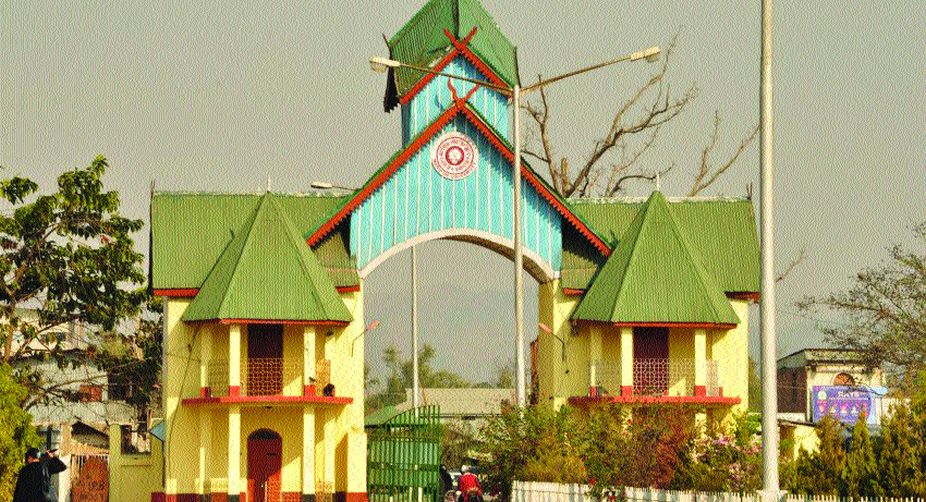Manipur University agitation to be suspended from tomorrow
The 75-day long agitation at Manipur University will be temporarily suspended from tomorrow after the stakeholders reached a mutual agreement on Thursday.

Admission to various post-graduate courses in Manipur University usually begins in June-July and by September the campus bristles with events and activity. This year the campus wore a deserted look. There were no tribal students because they refused to seek admission when the university authorities did not adhere to the reservation of 31 per cent seats for Scheduled Tribe students. They held demonstrations in front of the university gate.
Thangtinlen Haokip, a student of the education department and president of the Manipur University Tribal Students’ Union, said Meitei student groups like the Manipur University Students’ Union, Kangleipak Students’ Association and the Manipur Students’ Federation were against the 2012 amendment for 31 per cent reservation for Scheduled Tribes.
Advertisement
Haokip, who is coordinating protests and economic blockades, said tribal students called an indefinite economic blockade from midnight of 28 October along the National Highways 39 and 53, claming it was their democratic right to protest silently.
Advertisement
I also met V Shatshang, general secretary of the All Tribal Students’ Union, Manipur, and he said that ever since Manipur University came to be designated a Central university it followed the reservation policy of the Central Educational Institutions (Reservation in Admission) Act 2006. Under this, 7.5 per cent seats were reserved for Scheduled Tribes, 15 per cent for Scheduled Castes and 27 per cent for Other Backward Classes. He said these did not correspond with the population of Manipur. He explained that the tribal population numbered 902,740 (Census 2011), which amounted to 35.1 per cent of the state’s population ( 2,570,390). Manipur has an SC population of 97,042 — only 3.8 per cent of the state’s total. With no mention of OBCs in the Census, he wondered how the calculation for the percentage of reservations for the said OBC category was arrived at.
Until 2005, when Manipur University was under the state, the reservation for STs was 31 per cent.It fell to 7.5 per cent in the new 2006 Act, while the reservation for SCs was two per cent until 2005 and went as high as 15 per cent in 2006. Meanwhile, reservation for OBCs was 17 per cent until 2005 and this was raised to 27 per cent under the Central University Act, 2006.
Haokip and Shatshang said there had been numerous representations and lobbying to review the policy. After five years, the 2006 Act was amended in 2012. As per Gazette of India notification, the following amendments were made in Section 2 of the Central Educational Institutions (Reservation in Admission) Amendment Act, 2006 (hereinafter referred to as the principal Act), after clause (i), the following clauses of Section 2 shall be inserted, namely: “(a) specified north-eastern region” means the area comprising Arunachal Pradesh, Manipur, Meghalaya, Mizoram, Nagaland, Sikkim, Tripura and the tribal areas of Assam referred to in the Sixth Schedule of the Constitution”.
Surprisingly, tribal students were kept in the dark about the 2012 amendment. Shatsang said, “We came to know about the amendment only after two years when we met President Pranab Mukherjee when, in April 2014, he came for the 14th convocation. When we met the Presidfent to submit a memorandum, he told us that the amendments had already been made.
“Whenever we made inquiries we were given vague replies, like the intimation letter with regard to the amendment was mistakenly sent to a wrong address — Manipal University — and therefore did not reach Manipur.”
Two vice-chancellors have resigned over the impasse. A new, Professor AP Pandey of (Benaras Hindu University) has taken over.
According to Haokip, classes were to start by 7 November but till then no tribal students had sought admission.
The university reportedly agreed to the 31 per cent reservation and signed a memorandum of understanding on 7 November. When things were looking up, the vice-chancellor made a U-turn and reportedly signed another agreement with other student groups like the Manipur University Students’ Union, Kangleipak Students’ Association and the Manipur Students’ Federation, all valley-based Meitei groups and opposed to the 31 per cent reservation.
Students are caught in a power tussle between the university authorities and the University Grants Commission. While Manipur University is hell bent on exercising its (lost) authority, the UGC is under pressure to uphold its principles and norms. Currently, there is silence in the university, with several other issues cropping up and students’ concern taking a back seat. Who bothers about education and the future of youth anyway? This is not the first unrest the university has witnessed over the reservation issue. As in other years, this issue will crop up every now and then unless the university authorities are prepared to followed norms and policy, and are committed to transparency
— Ninglun Hanghal
(The writer is an imphal-based freelance contributor.)
Advertisement